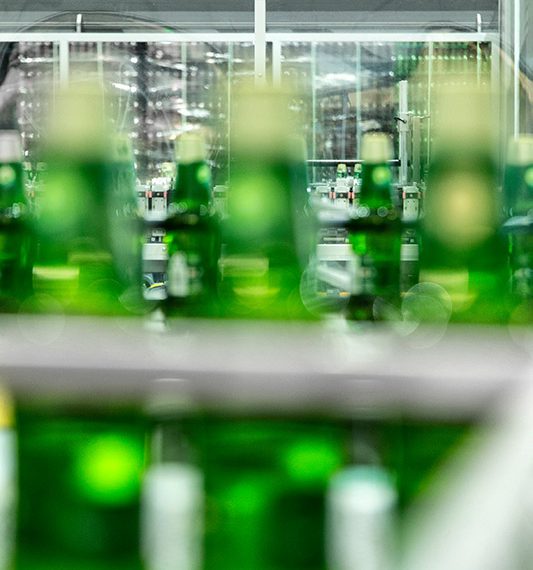KHS and Martens are continuing their joint strategy for reducing packaging material. Just last year the traditional Belgian brewery invested in an Innopack Nature MultiPack machine which uses adhesive dots to join PET bottles into stable packs. Now the group is planning to purchase a second NMP machine, which processes cans, from KHS. Thanks to the expansion the brewery will have greater flexibility to meet the market’s growing demand for environmentally friendly packaging. The NMP project is just one example of the Dortmund-based full-range supplier’s steadily growing portfolio of sustainable packaging solutions.
Since 2020 the company has been relying on the material-saving Nature MultiPack from KHS. Together the long-standing partners implemented film-free six-packs made of PET bottles for the retail trade. The response to the alternative to classic shrink film has been very positive:
“We were able to convince both our customers and consumers. The high demand shows that environmentally friendly packaging is in high demand.”
— Jan Martens, Brewery Manager
Into new markets with Nature MultiPack
Thanks to the new line, the Belgian beer producer will in future be able to process not only PET bottles but also cans into stable yet easily separable packs. This eliminates the need for shrink film or cardboard packaging and reduces material consumption by up to 90 percent. “This benefits both consumers and the environment,” says the brewery boss.
While the brewery produces at an output of up to 54,000 containers per hour, which is sufficient for them, KHS now also offers the Innopack NatureMultiPack machine for the high-performance range. This further developed variant enables up to 90,000 containers per hour — and even up to 108,000 if the capacity is exceeded.
This should make it possible to penetrate new markets. “Retailers are increasingly looking for environmentally friendly packaging options. I am very confident that our resource-saving Nature MultiPack solutions will meet with great interest,” predicts the brewery boss. Now his brewery has the necessary flexibility to meet the current needs of the trade in the best possible way.
Secondary packaging: KHS offers an extensive portfolio
The Nature MultiPack is just one example of the continuously increasing variety of sustainable and forward-looking secondary packaging from KHS. The Dortmund-based full-range supplier pursues a clear strategy of taking a holistic view, as Sören Storbeck, Global Product Account Manager Packaging at KHS, explains, “Our overriding aim Page 3 of 6 is to meet every need of our customers in the best possible way. We therefore rely on a comprehensive portfolio of line and packaging solutions, as well as on our global service network, which is available to our customers around the clock.”
The line manufacturer’s latest innovations include the Innopack Kisters Wraparound Shrink Paper Packer (WSPP A), which can pack cans either in paper, cardboard or film. This variety is made possible by the modular design of all Innopack Kisters machines. This allows existing models to be quickly and flexibly retrofitted with additional paper functionality. With its combination of different process modules, a WSPP A, for example, can process three different types of secondary packaging: the wraparound carton, the tray, and the pad, which can be wrapped either in paper or shrink film. As of now, it is also possible to process film made from 100 percent recyclate on Innopack Kisters machines — without any loss of quality or performance.
Another pioneering packaging alternative can be produced with the new Innopack Kisters CNP (Carton Nature Packer). This high-performance, flexible packer uses corrugated cardboard and solid board tops to join cans together to form rigid packs. KHS’ development spirit doesn’t stop there, however: “We’re striving for even more efficient and sustainable solutions — whether in the field of primary, secondary, or tertiary packaging,” says Storbeck. “Together with our customers and partners we’re constantly working on conserving even more resources and further strengthening the recycling loop.”

















